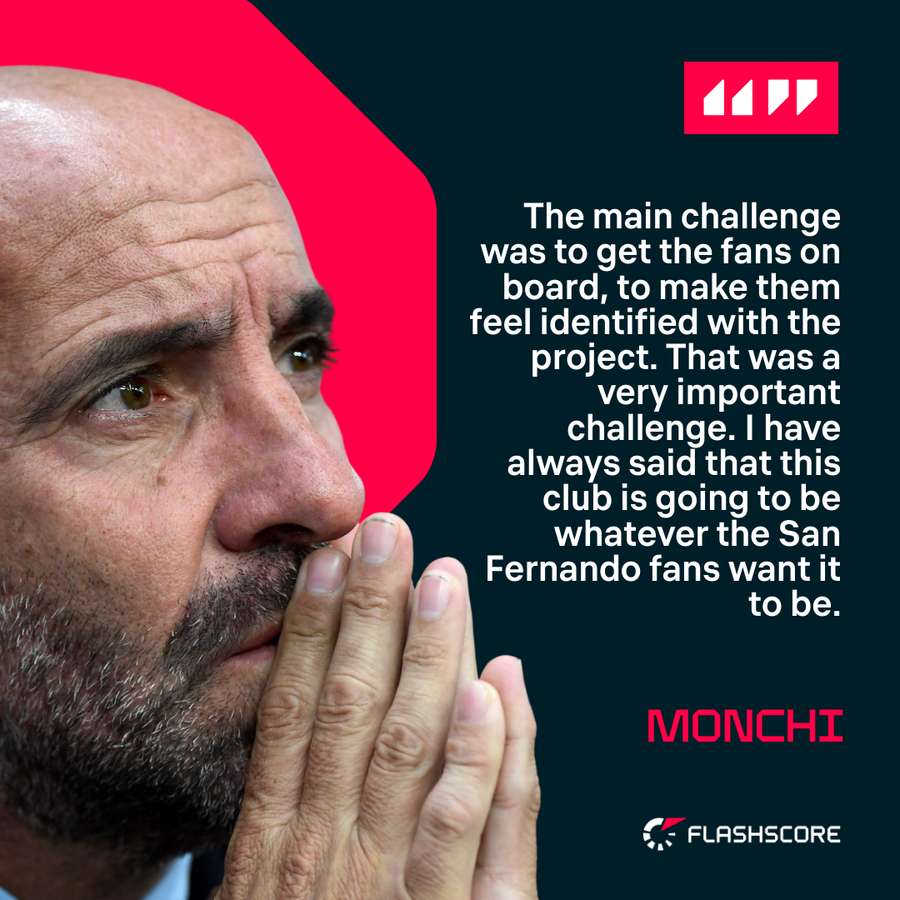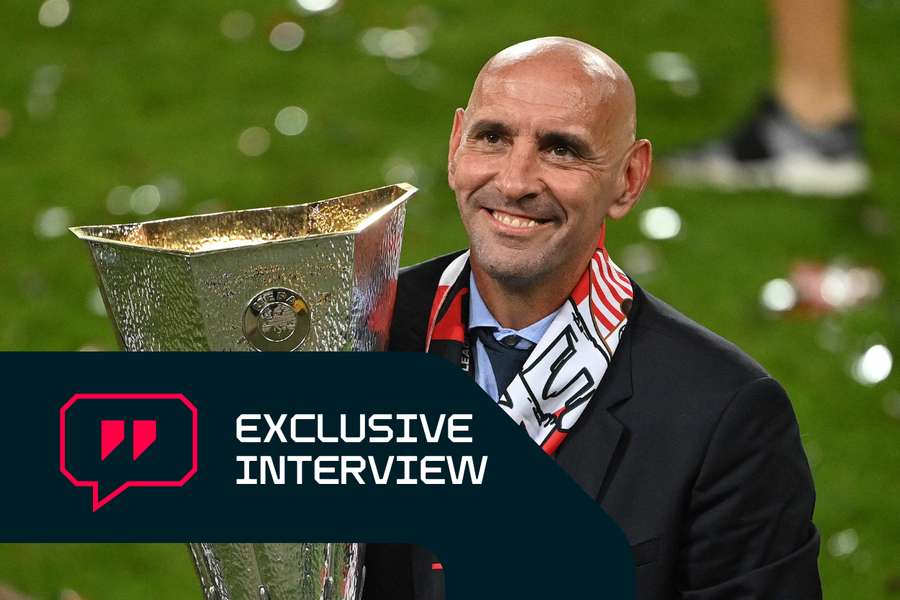In this first part of the interview, Monchi tells us about his enthusiasm for his hometown club San Fernando, which he is trying to bring back from the dead as president.
He also discusses his various stages at Sevilla and some of the names that made the club enjoy the best stages of its long history.
The second part - which you can read here - delves into his time at Roma and Aston Villa.
Question: Let's start strong, Monchi: What led you to lead the project in San Fernando?
A: "The story is very complex, but fundamentally, to sum up, the affection for this city, which is my city, the affection for football in San Fernando and, possibly, a choice of life. Trying to square the circle of my professional life.
"I started here many years ago and I had the illusion of returning to San Fernando to carry out a project. Possibly, the times have moved forward a little, but, fundamentally, it is the illusion of being able to do something in the city where I was born, both personally and in terms of football."
Q: And what have been the biggest organisational and sporting challenges? Because there are many, I suppose.
A: "There were many challenges, because it was a new club, practically from nothing. The main challenge was to get the fans on board, to make them feel identified with the project. That was a very important challenge.
"I have always said that this club is going to be whatever the San Fernando fans want it to be. So, to be able to create a new club, that the people assume is theirs - in fact, the slogan is "El club de toda la vida" (the club of a lifetime) - was one of the most important challenges and I think that we have achieved it."

Q: And are you trying to implement the model of play that you learned at Sevilla, Aston Villa and all the other big clubs?
A: "We are trying to implement the model of the club, more than the game. A club that is very dynamic, very agile, in which people feel reflected. A club where the people who work do so not because they have a work connection, but because they have a sentimental connection.
"What happens is that it's early days. We are talking about days, months since the club was founded, so we still have a long way to go. And we can't forget the modesty, the humility of the project, a project that starts from the bottom."
Q: And the plans? I suppose they are ambitious, but in the medium and long term, have you already thought of everything in your head?
A: "I have something in my head. In the medium term, to create a structure that is as horizontal as possible and as well-founded as possible, as solid as possible, to grow from there. In the long term, to try to get the team into professional football."
Q: And with the experience in the transfer market that you have with other clubs like Sevilla, Roma or Aston Villa... What is the idea?
A: "The thing is that it is still early days. Right now, what we are trying to do is to configure, or we have tried to configure, a squad where there is a mixture of youth and experience, because obviously, the categories where we are or where we are going to be in the short term are demanding categories. But yes, in the future, we will try, if possible, to clone everything that has been done in the past and that has been successful."
Q: Will you be bringing any stars to San Fernando soon?
A: "We still have a long way to go. We still have a long way to go because the categories are not yet attractive for important players, but we'll see in the future."
Q: If Sergio Ramos' career is going to end there, for example.
A: "(laughs) We don't know how much Sergio still has left. Sergio still has a lot of battery. He's helping us in a very background profile, obviously, but he's helping us. The one who is in the day-to-day is his brother René, who is the vice-president and one of the drivers of the project."
The great Sevilla: from Dani Alves and Rakitic to Kanoute and Luis Fabiano
Q: At Sevilla, you gained notoriety for identifying young talents who later became stars. What is the secret behind this? How did you work on this on a daily basis?
A: "Fundamentally, when I arrived at Sevilla, I was clear about something, which was to be able to create a structure, a sports management model that would allow us to get ahead of other clubs in the detection of talent. But it was no longer just me. I believe that our success has not only been the detection of talent, but also the management of talent. That is just as important. I think we have been good detectors, but also good managers.
"And that has been our line, always hand in hand with the coach, trying to find the profiles that the coach could use. And that, together with the growth of the club from the second division, has obviously increased the players' exposure, which has increased their value."
Q: How did the arrival of Dani Alves get completed for only 500,000 euros?
A: "It was very complex because Daniel, I don't know if you remember, came on loan for 18 months in the January market in 2003. The luck, in inverted commas, for us, the misfortune for his club of origin, is that they were going through a dramatic moment economically, so we were able to take advantage of that situation to buy him at a lower price than what had been agreed.
"Daniel's case is very atypical. You don't buy a player for 600,000 dollars, more or less what he cost, and five years later you sell him for more than 40 million, but in that career you win I don't know how many titles, and that's one in a thousand.
"Obviously, this child has many 'parents', not just the sporting management. The management of Caparros at the time, the management of Juande Ramos afterwards, the growth of the club, the player himself, who was a magnificent professional. All the conditions were in place for the perfect signing."
Q: Ivan Rakitic? Also, another case in which he bought cheap, in inverted commas, and then went on to have a great career.
A: "He practically came for free because his contract with Schalke was coming to an end. With Ivan, who was also a January signing, coincidentally, there were also a series of circumstances. He arrived at a complicated time and I think he was a champion of the club's growth.
"It was a win-win situation, a win-win, because he was a magnificent professional who also adapted very well. In the end, we can't forget that footballers are people and there are many players who don't perform well because they don't manage to adapt. In Ivan's case, everything was very easy. And his adaptation to Sevilla was such that today he considers himself just another Sevillian."
Q: Yes, he seems more Andalusian than Croatian. I also wanted to ask about that, if in the recruitment process, in the case of Ivan and of Dani Alves, do you meet the players? Do you make video calls or do you go to the games and have, I don't know, a coffee and talk? What is the process?
A: "I try to get to know the person. And there are situations that allow you to sit down with him and see him personally. There are other situations, video calls, which nowadays technology allows us to do much more. But I always try to talk to see what he is like, if he is excited to come, if he is hungry, if he is professional, if he knows the style of play, and if he likes football.
"All these things are important when it comes to drawing a complete profile of the player, so that we don't just focus on the tactical, technical or physical aspects, but also on the human aspect."
Q: And have you discarded many good players because of what you say?
A: "Many have not, but some have, because they have not transmitted that illusion to me or because we have found out that their professional life was not the most suitable. Not many, but some did."
Q: But it was your decision, not the player's, I suppose?
A: "More mine for not finding the answer I was looking for."
Q: The arrivals of Luis Fabiano and Kanouté, who formed a wonderful duo at Sevilla. What was it like?
A: "Well, I don't think we're still not able to assimilate or realise how fortunate Sevilla were to have two of the best strikers in the history of the club, for sure, and in world football as well.
"Luis was our priority target. In the case of Kanoute, no. We wanted to sign another Brazilian, Fred, but he went to Olympique Lyon. The second option was Kanoute and, well, he arrived, and little by little, he became what he became. Those were magnificent years, weren't they? A duo that few teams in the world could have."
Q: And Adriano Correa? How did you detect that kind of talent? Because it wasn't obvious.
A: "Adriano is a very similar profile to Daniel (Alves), playing in a small team in Brazil. We were looking for that profile of a full-back and we had good reports on him. The option was given for him to come here because there were many teams interested, and it was also a quick adaptation and a magnificent performance."
Q: You returned to Sevilla in 2019. What change did you notice the most? Had the club and the environment changed a lot?
A: "Yes, it had changed for the better, especially in something that, for me, in my time in Rome, was an important discovery, which was the use of data. The Sevilla that I find is a Sevilla that wants to bet on growing through data, which was, I think, one of the things that could make us different from the rest. And I came from a club like Roma that was also committed to data, so, as they say here in Spain, hunger was combined with the desire to eat. And the truth is that it was a very exciting start to the project."

